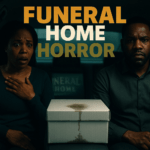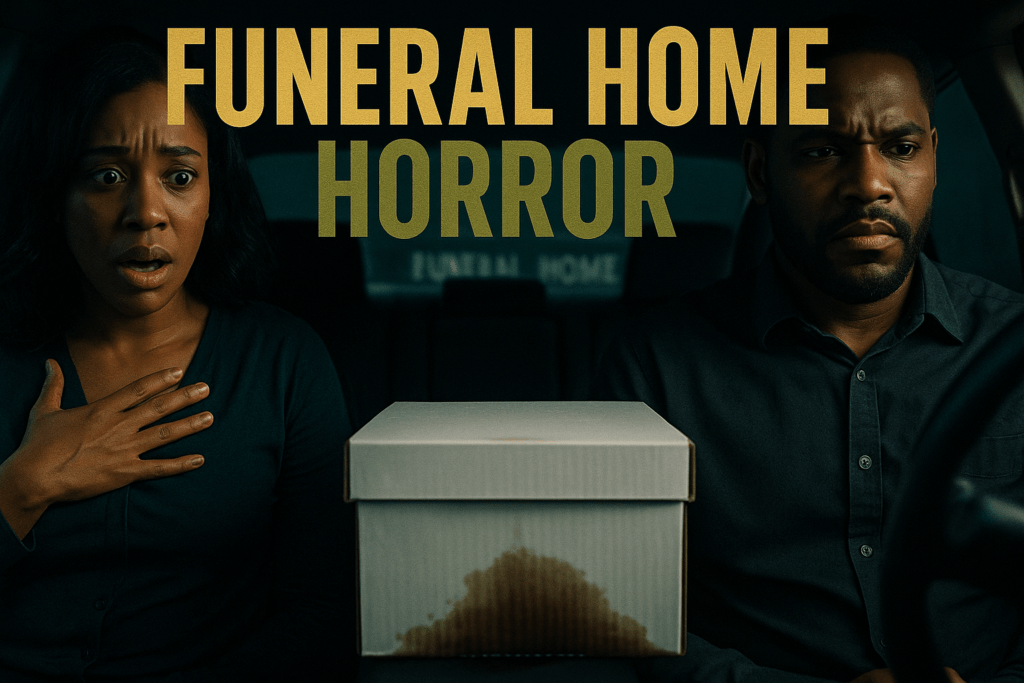

Funeral Home Nightmares: A Deep Dive
By Darius Spearman (africanelements)
Support African Elements at patreon.com/africanelements and hear recent news in a single playlist. Additionally, you can gain early access to ad-free video content.
Unimaginable Grief: The Brain in a Box
Imagine the profound grief of losing a child, only to have that sorrow compounded by an unimaginable horror. This is the reality for Lawrence and Abbey Butler, who are suing two funeral homes after allegedly receiving their deceased son’s brain in a leaking box (foxbaltimore.com; wsbtv.com). The couple filed a lawsuit against Southern Cremations & Funerals in Georgia and Nix & Nix Funeral Homes in Philadelphia (foxbaltimore.com; wsbtv.com). They claim they received a white, unmarked box that began to smell and leak fluid in their car (foxbaltimore.com). This box, they discovered, contained their son Timothy Garlington’s brain and brain matter (foxbaltimore.com).
The lawsuit accuses the funeral homes of negligence in handling human remains and intentional infliction of emotional distress (foxbaltimore.com). Negligence, in this context, refers to a failure to exercise the care that a reasonably prudent person would exercise in similar circumstances. For funeral homes, this means adhering to strict standards for the respectful and sanitary handling of deceased individuals. Intentional infliction of emotional distress is a legal claim alleging that one party’s extreme and outrageous conduct caused severe emotional harm to another. The owner of Nix & Nix Funeral Home stated that his employees did not know there was brain matter in the box, as they did not open it, and it did not start leaking until days after the Butlers received it (foxbaltimore.com). Nix & Nix Funeral Home claims that all items should be intact and accounted for when other funeral homes send shipments (foxbaltimore.com). The Georgia State Board of Funeral Services conducted an investigation that did not result in a revocation or suspension of the license, and the findings are not public (wsbtv.com). The family’s attorney, L. Chris Stewart, stated that “there is at no point where the brain is separated from the body in that fashion and shipped in that fashion” (foxbaltimore.com). This highlights a significant deviation from standard funeral home protocols, which prioritize the integrity and respectful handling of remains.
Maggots at the Viewing: A Mother’s Nightmare
In a separate, equally horrifying incident, a lawsuit has been filed against a funeral home in Virginia after a mother found her deceased son’s body “consumed by clumps of maggots” at his viewing (katv.com). Tabitha Worrell filed a lawsuit against Snelling Funeral Home in Chesapeake, Virginia, after her 24-year-old son, Torreon Williams, who died in a car accident, was found covered in maggots at his viewing (katv.com; usatoday.com). The lawsuit alleges that the maggots had been on and in Torreon Williams’ body for a significant period of time and had burrowed into holes in his cheek and mouth that had not existed previously (katv.com; usatoday.com).
Worrell had made a down payment of $3,000, and the funeral home agreed to complete sanitary care and dress the body (usatoday.com). At the viewing, mourners noticed the facility doors were open and the facility was warm (usatoday.com). This detail is crucial, as temperature and environmental conditions play a significant role in decomposition and insect activity. Maggot infestations occur when flies lay eggs on decaying organic matter, and warm, open environments can accelerate this process. Proper embalming, refrigeration, and sealed conditions are essential for preventing such occurrences. Snelling Funeral Home is a member of the Hollomon-Brown family of funeral homes (usatoday.com). The fact that this funeral home is part of a larger family of businesses raises questions about oversight and consistent adherence to professional standards across an organization.
Understanding Funeral Home Negligence
Funeral homes are entrusted with the sacred duty of caring for our loved ones after they pass. This trust comes with a legal and ethical obligation to handle remains with dignity, respect, and proper care. When a funeral home fails in this duty, it can be considered negligence. Negligence in the funeral industry can manifest in various ways, including misplacing remains, improper embalming, or failing to maintain sanitary conditions. For instance, if a funeral home mixes up cremated remains, that is a clear breach of their duty of care (theforesightcompanies.com).
The legal consequences for funeral homes found negligent or violating regulations can be severe. These can include lawsuits for damages, regulatory complaints, and potential sanctions from state regulatory boards. These sanctions can range from fines to license suspensions or revocations. In some extreme cases, such as providing fake ashes or selling body parts, funeral home operators have faced criminal charges and sentencing (theconversation.com). These legal and regulatory measures aim to protect consumers and uphold the integrity of the funeral service profession.
Prevalence of Mishandling Remains
While the cases of Timothy Garlington and Torreon Williams are particularly shocking, incidents of mishandling remains and other forms of negligence are not uncommon in the funeral industry. Approximately 3,500 complaints of funeral home negligence are filed annually with state regulatory boards in the United States (lentolawgroup.com). This staggering number indicates a systemic issue that extends beyond isolated incidents. The majority of these complaints involve failure to comply with family instructions, misidentification, or the improper storage or handling of remains (lentolawgroup.com).
Furthermore, about 10% of funeral homes in the U.S. have been cited for negligence or misconduct violations (lentolawgroup.com). Recent scandals in Colorado, including cases of mishandled remains and fake ashes, have even prompted tighter regulations in that state (theconversation.com). These statistics underscore the importance of vigilance and accountability within the funeral industry. They also highlight the need for families to be aware of their rights and the recourse available to them if they suspect mishandling or negligence.
Annual Funeral Home Negligence Complaints
The Funeral Rule and Consumer Rights
The Federal Trade Commission’s Funeral Rule is a vital protection for consumers, ensuring transparency and fair practices in the funeral industry. While not directly mentioned in the lawsuits, understanding this rule is crucial for families navigating funeral arrangements. The Funeral Rule requires funeral homes to provide itemized price lists, allowing consumers to choose only the goods and services they want. It also prohibits funeral homes from misrepresenting legal or cemetery requirements, or from embalming a body without permission.
This rule empowers families by giving them control over the funeral planning process and preventing them from being pressured into purchasing unnecessary services. It also mandates that funeral homes must provide accurate information about prices and options, which helps prevent deceptive practices. Knowing your rights under the Funeral Rule can help prevent some of the issues that lead to negligence claims. For example, understanding that embalming is not always required by law can prevent a family from being charged for an unwanted service.
Recourse for Families
When families suspect mishandling or negligence by a funeral home, they have several avenues for recourse. One of the most important steps is to seek legal assistance from a lawyer specializing in funeral home negligence (lentolawgroup.com). These legal professionals can help determine if a funeral home breached its duty of care, which is a key element in negligence cases (theforesightcompanies.com). A breach of duty of care, such as swapping cremated remains, can lead to legal action (theforesightcompanies.com).
In addition to legal action, families can file complaints with state regulatory boards, which receive approximately 3,500 complaints annually (lentolawgroup.com). These boards are responsible for overseeing funeral homes and ensuring they comply with state laws and regulations. While the findings of some investigations, like the one involving Timothy Garlington’s case, may not be public, filing a complaint can still trigger an investigation and potentially lead to disciplinary action against the funeral home. These actions provide a pathway for families to seek justice and hold negligent funeral homes accountable for their actions.
Recourse Options for Families
Seek Legal Assistance
Consult with a lawyer specializing in funeral home negligence to assess your case and pursue legal action for damages.
File Regulatory Complaints
Submit a complaint to your state’s regulatory board for funeral services, which can investigate and impose sanctions.
Understand the Funeral Rule
Familiarize yourself with the FTC’s Funeral Rule to understand your rights and protections as a consumer.
The Human Impact of Mishandling Remains
The emotional and psychological impact on families who experience the mishandling of their loved ones’ remains is profound and devastating. When a family is already grappling with the immense pain of loss, incidents like receiving a deceased son’s brain in a leaking box or finding a body covered in maggots inflict an additional layer of trauma. This trauma can manifest as severe emotional distress, anxiety, depression, and even post-traumatic stress disorder. The trust placed in funeral homes is deeply personal and sacred, and its betrayal can leave lasting emotional scars.
Families often describe feeling re-victimized and robbed of their ability to grieve properly. The grotesque nature of these incidents can haunt them, making it difficult to find closure or peace. The legal term “intentional infliction of emotional distress” attempts to capture this profound suffering, but it barely scratches the surface of the human experience. These cases highlight the critical need for funeral homes to uphold the highest standards of care, not only for the deceased but also for the emotional well-being of the grieving families they serve. The long-term psychological effects can be significant, requiring extensive support and therapy to process the trauma.
Emotional Impact on Families
Severe Emotional Distress: Families experience profound psychological pain, anxiety, and grief compounded by the traumatic incident.
Betrayal of Trust: The sacred trust placed in funeral homes is shattered, leading to feelings of betrayal and anger.
Difficulty Grieving: The traumatic experience can impede the natural grieving process, making it hard for families to find closure.
Lasting Psychological Scars: Incidents can lead to long-term psychological effects, including PTSD, requiring professional support.
Ensuring Proper Handling and Sanitation
To prevent such horrific incidents, funeral homes must adhere to rigorous protocols for handling, storing, and transporting human remains. These protocols include proper embalming techniques, which involve preserving the body to delay decomposition and maintain its appearance. Furthermore, remains must be stored in climate-controlled environments, typically refrigerated units, to prevent decay and inhibit insect activity. The facility itself must maintain high standards of cleanliness and sanitation to avoid contamination and pest infestations.
When remains are transported between funeral homes, as in the Garlington case, strict chain-of-custody procedures are essential. This means that every transfer must be documented, and the contents of any container should be verified to ensure accuracy and integrity. The attorney’s statement that “there is at no point where the brain is separated from the body in that fashion and shipped in that fashion” underscores the deviation from accepted professional standards. These measures are not merely guidelines; they are fundamental to the respectful and dignified treatment of the deceased and the peace of mind of their grieving families.
ABOUT THE AUTHOR
Darius Spearman has been a professor of Black Studies at San Diego City College since 2007. He is the author of several books, including Between The Color Lines: A History of African Americans on the California Frontier Through 1890. You can visit Darius online at africanelements.org.
